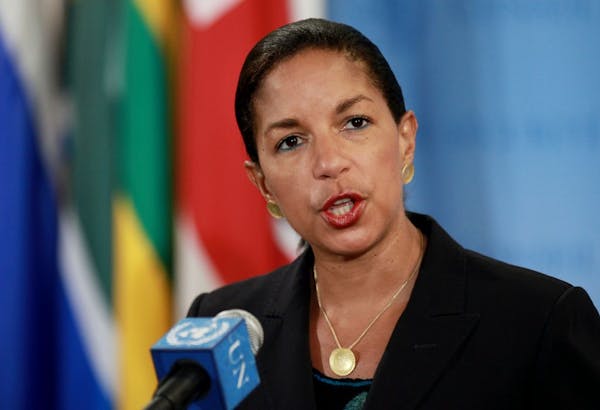Fred Kaplan, Slate:
The next topic of discussion in Washington political circles is clear: Was this a defeat for President Obama and a victory for Sen. John McCain of Arizona?
McCain had been the most adamant, among a handful of Republicans, who blamed Rice for her role in spreading false information about the terrorist attack on the U.S. consulate in Benghazi, Libya. The criticism was spurious.
Rice did go on several Sunday talk shows and say that the attack stemmed from spontaneous protests against an American-made anti-Muslim video -- an analysis that turned out to be untrue. But it was very clear -- and no one has disputed -- that Rice was merely reciting a "talking points" memo circulated by the U.S. intelligence community. As U.N. ambassador, Rice had no line of authority over events in Libya.
McCain pulled a very clever gambit, announcing publicly that he would seek a chair on the Senate Foreign Relations Committee (while retaining his status as top Republican on the Armed Services Committee). This would give him a direct role in the interrogation and confirmation of Rice or any other nominee for secretary of state. It would also allow him to request hearings and to call the secretary as a witness on any number of topics that he and his Republican colleagues might wish to investigate. He could be a constant thorn in the administration's side on an issue -- foreign policy, broadly speaking -- that presidents are usually allowed to pursue with great leeway and that this president has pursued with success and high ratings.
In the end, with all the other fights Obama has on his hands in his second term, this one didn't seem worth the struggle.
A White House spokesman said in an e-mail that McCain's attacks had nothing to do with Rice's decision. A spokesman on McCain's staff said in a phone conversation that Rice's pending nomination had nothing to do with his decision to seek a seat on the Foreign Relations Committee. Both statements deserve a cocked eyebrow.
This was certainly a political confrontation, and Obama backed down. But that doesn't mean, necessarily, that he lost or that McCain won -- at least not on any issue beyond whether Rice will be nominated as secretary of state, something Obama hadn't yet done in any event. It doesn't necessarily tilt the outcome of any conflict to come.
One thing that seems clear about Obama: He values loyalty but not to the point of sentimentality or obstruction. He won a mandate in the 2012 election, and he wants to exploit that fact as quickly as possible, knowing that presidents often lose momentum -- tend to fall into lame-duck syndrome -- as their second terms get under way. Rice's withdrawal sweeps away the partisan games that he clearly detests and clears the path for what he sees as the business of governing.
* * *
Ruth Marcus, Washington Post:
It is a strange world in which a person is compelled to announce her withdrawal from consideration for a position for which she has not been nominated.
Strange and, more to the point, ugly. I know Susan Rice only a bit. I have no strong view about whether she would have been a good secretary of state. But I do believe that the lengthy public twisting-in-the-wind process of her non-nomination reflects badly on nearly everyone involved -- on Republicans, most obviously, but also on the president.
I've had my say, previously, about the Republican piece of the Rice debacle. The preemptive attack on her was unfair. The Benghazi scandal is not about whether Rice. It's about whether the security was adequate in the first place. The venom of the assault on Rice was way disproportionate to her alleged crime.
And though I do not think this was conscious on the part of her critics, I cannot help but believe that the attack had something to do with Rice's gender, and her sharp elbows and sometimes sharper tongue. Men can have those flaws and still succeed; women find themselves marked down. This is a new, subtler sexism: Rice failed to fit the modern model of collegial, division-healing woman.
But then there is the president's treatment of Rice, and the odd language, redolent of a more chivalrous age, that he used in an impassioned defense of Rice at his postelection news conference. If Rice's Republican critics "want to go after somebody, they should go after me," Obama proclaimed. "For them to go after the U.N. ambassador ... and to besmirch her reputation, is outrageous. ... When they go after the U.N. ambassador, apparently because they think she's an easy target, then they've got a problem with me."
I am not saying that the president is sexist, not at all. But I think that phrasing is telling -- besmirch her reputation, go after me, easy target. I doubt that he would have used that language in coming to the defense of a man who was a potential nominee.
Which leads me to the real unfairness to Rice: After the chivalry came the abandonment. How could the administration have left her twisting for nearly a month while it calibrated the likelihood -- and likely costs -- of pressing the nomination?
Mr. President, either nominate her or pick someone else -- like, two weeks ago. Don't leave her out there, fending for herself.
Thursday's humiliating denouement fooled no one who has been around Washington for more than a minute and a half. If the president wanted Rice, her withdrawal never would have been accepted.
It never should have been allowed to come to this.
Cut down on electronic waste in Minnesota
In Minnesota, statistical gloom amid the hope of a progressive-led boom


